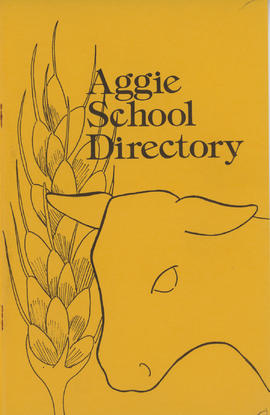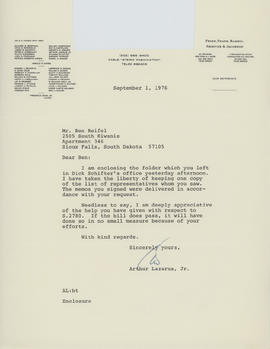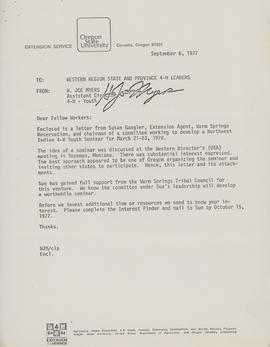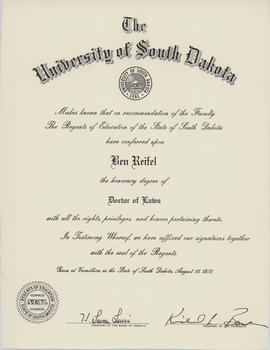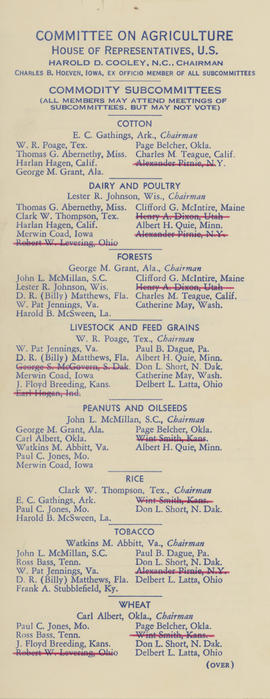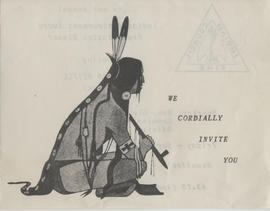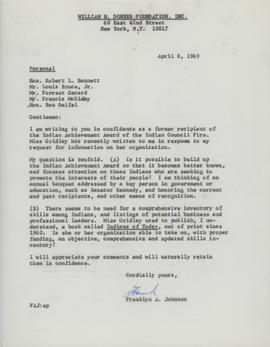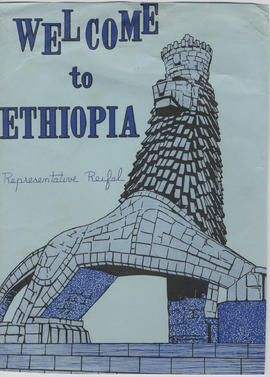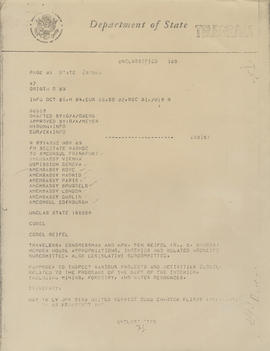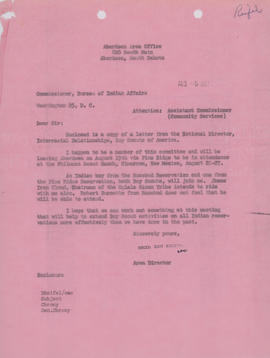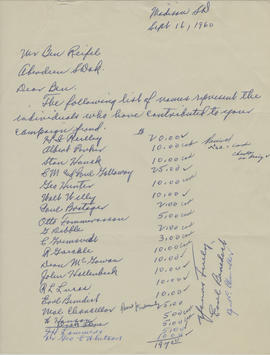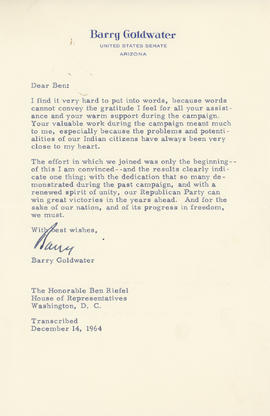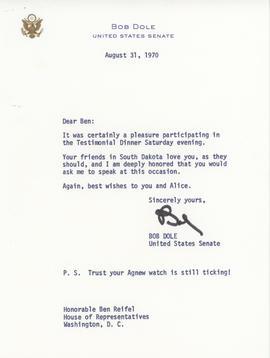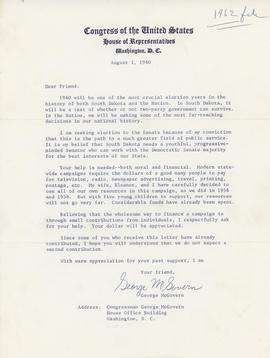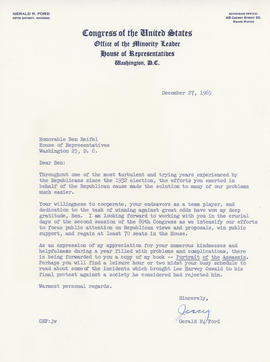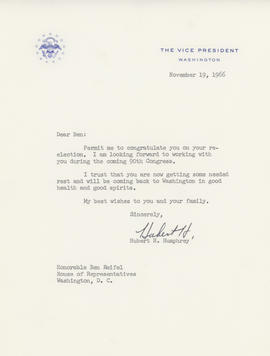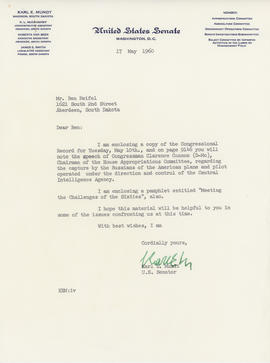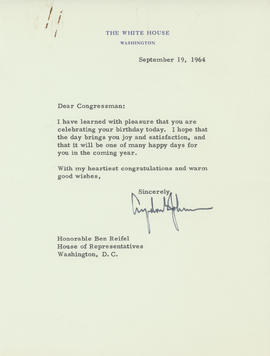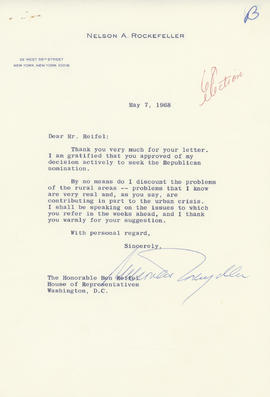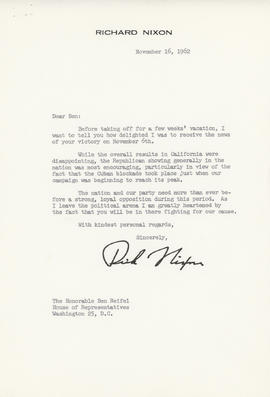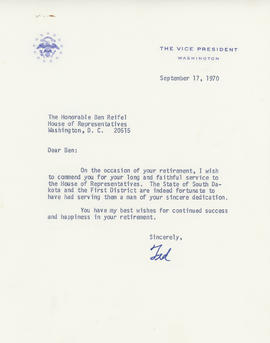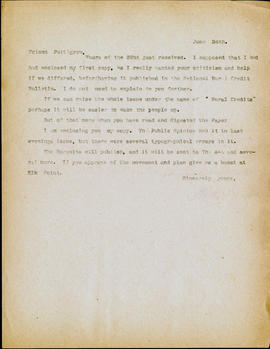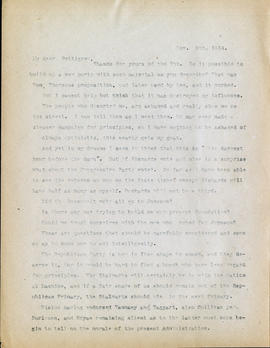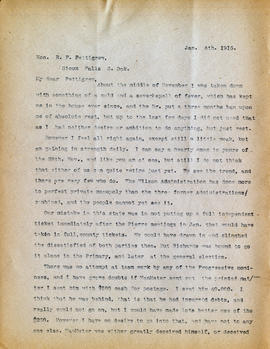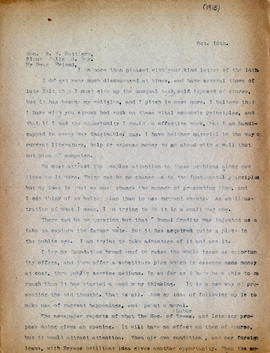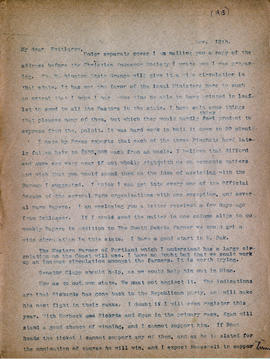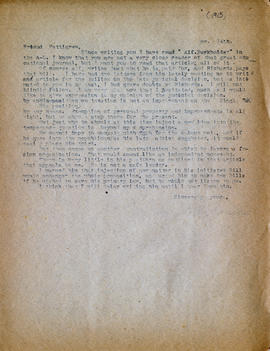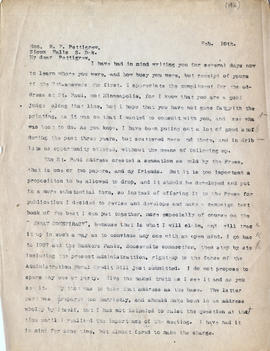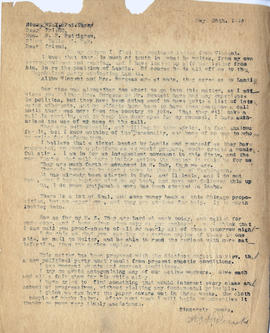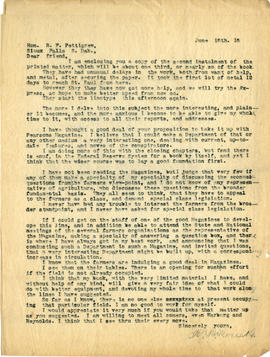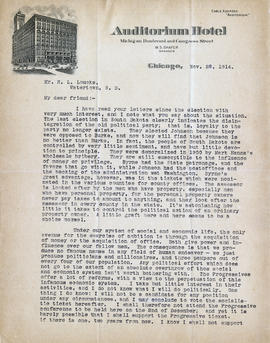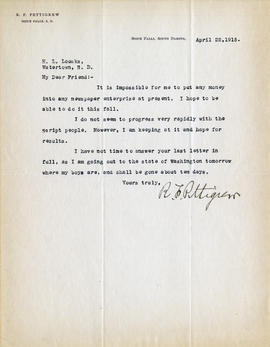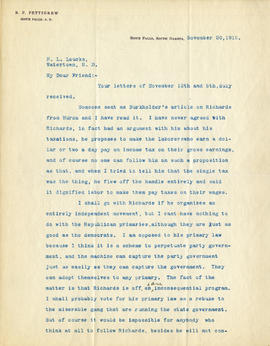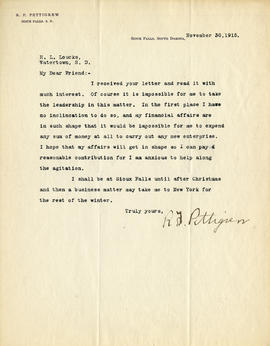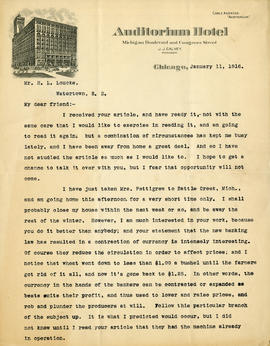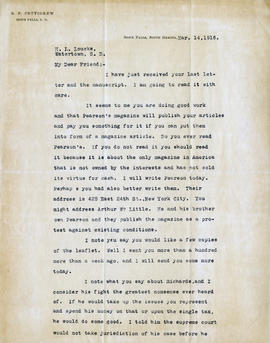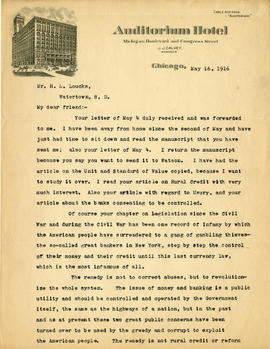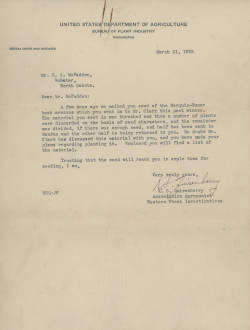This collection is composed of clippings, membership and committee lists, correspondence, meeting agenda, programs, finances and a brief history of the group. Also included is a rough draft of an official complaint of discrimination at South Dakota State University filed with the Office of Federal Contract Compliance Programs and notification of results of the investigation.
South Dakota State University. Academic Women's Equity CoalitionThis collection is composed of materials from a trip made by Musson to Somalia, East Africa in 1954. Included are scrapbooks, photographs, negatives, slides, notes, correspondence, some publications and articles about Somalia, maps, and trip preparation items.
The scrapbooks consist of pictures taken while in Somalia. Included are Musson's translations of the Italian descriptions that are written on the back of most of the pictures. The photographs, negatives and slides consist of more pictures of Somalia but do not include any description of each image.
The notes consist of writings made by Musson while in Somalia. The correspondence consists mainly of communications with the Foreign Operations Administration in preparation for Musson's trip. The publications and articles include items about Somalia that Musson probably read in preparation for his trip. The trip preparations include information about customs in Somalia, immunizations for travel abroad, and some paper work that includes an investigation form for security clearance that details some biographical information about Musson. Also included are a few maps of Somalia that show some of the places that Musson visited.
Musson, Alfred LymanThe collection consists mostly of the retirement book created by the SDSU library staff for Alfred G. Trump's retirement party on June 5, 1972, in Brookings. The book includes numerous letters, one telegram, several news clippings, as well as 27 color photographs of the party. It also includes two programs from the retirement party with menu. The papers also contain a certificate of recognition from the Mountain Plains Library Association, two plaques presented to Trump as token of appreciation for his commitment to South Dakota State University, and a certificate of completion from the University of Denver's Annual Institute of Archival Administration. There is also the Proclamation of Anne Trump Day (April 5, 1981) presented to Anne Trump by the Brookings City Commission.
Trump, Alfred G. (Alfred George), 1907-1994Includes Aggie School Directory, History of the School of Agriculture at South Dakota State College and correspondence to Ben Reifel.
The materials in this collection were collected and donated by Dr. Charles Woodard of the South Dakota State University English Department. The collection is primarily composed of correspondence between Audrae Visser and Dr. Woodard and includes many of her writings to fulfill class assignments. Also included are photographs she took and written accounts of her frequent travel vacations, as well as materials related to her awards, honors, and activities as a poet and as a member of numerous organizations.
This collection consists of correspondence, clippings, photographs, and many poetic and prose writings by Visser including book reviews and reports, speeches, and a Pioneer Humor Project undertaken to fulfill the requirements of the Heritage of the Prairies Institute at Southwest State University in Marshall, Minnesota.
Visser, Audrae 1919-2001Ben Reifel's notes and correspondence in regards to the Black Hills Bill
Correspondence between Ben Reifel and various people from different organizations pertaining to his new job as Superindendant of Pine Ridge Schools.
Letter from Congressman Ben Reifel to Linda M. Hasselstrom of Sioux City, Iowa in regards to an article written in the July 11, 1965 issue of the Rapid City Journal about the Sun Dance. Included is a clipping of the article and an additional Rapid City Journal article about Crazy Horse.
Correspondence to Ben Reifel about the Northwest Indian 4-H Seminar, as well as an explanatory letter, program schedule, and survey for the seminar.
Ben Reifel's honorary Degrees and letters from University of South Dakota and Northern State College.
Correspondence between Ben Reifel and members of Congress about his wish to be elected to the House Committee of Appropriations.
Correspondence and invitations from the Indian Council Fire in regards to the annual Indian Achievement Award Presentation Dinner in honor of Ben Reifel in Chicago.
Correspondence between Ben Reifel and members of the Indian Council Fire in regards to his becoming the Chairman of the Indian Achievement Award and being put on the national board of the Indian Council Fire Publications, Inc.
Itineraries, dinner invitations, and a welcome letter from the American Embassy of Ethiopia to Ben Reifel during his time there.
Itineraries from trips to the different countries Ben Reifel visited in Europe, as well as thank you letters from Ben to everyone who helped them while they were on their trip.
Ben Reifel's correspondence with the Boy Scouts of America
Lists and letters from those who pledged money for Ben Reifel's campaign.
Correspondence between Ben Reifel and the Department Head of Dairy Husbandry at South Dakota State University in regards to Ben asking for work in the laboratory there.
Correspondence between Ben Reifel, members of the Association on American Indian Affairs, and the secretary of Harvard University in regards to his acceptance at the university, and his temporary leave from the Bureau of Indian Affairs.
Correspondence in regards to Ben Reifel and an article he wrote for the Christian Science Monitor while he was at Harvard. Also includes correspondence between Reifel and the Department of the Interior in regards to his studies of relocation for Crow Creek and Lower Brule reservations.
Correspondence in regards to Ben Reifel's transfer from Fort Berthold Reservation to the Pine Ridge Reservation in South Dakota.
Correspondence congratulating Ben Reifel on the thesis he wrote during his education at Harvard University. Also includes correspondence in regards to his being named the Superintendent of the Fort Berthold Reservation in North Dakota.
Correspondence in regards to Ben Reifel being awarded the Outstanding American Indian of the Year award.
Correspondence to Ben Reifel in regards to land allotments and their appraisels.
Letter from Ben Reifel to Everett E. Hagen, Professor of Economics, expressing his gratitude for hospitality during his stay in Aberdeen and at the reservations.
Correspondence to and from Ben Reifel in regards to his campaign for congress.
Correspondence in regards to Ben Reifel making an appearance and speaking at various church meetings and colleges.
Correspondence in regards to Ben Reifel's successful nomination as a Republican Party candidate in the primaries
Correspondence between Ben Reifel's campaign manager and those in charge of certain events and schools, arranging for Ben to speak. Also includes itineraries of events that Ben attends.
Correspondence between Ben Reifel and other members of Congress in which they congratulate him for his victory in winning the election.
Correspondence in regards to Ben Reifel and his campaign for congress.
Correspondence in regards to Ben Reifel making an appearance at different convention meetings and colleges during his campaign.
Correspondence in which Ben Reifel as well as those helping with his campaign, arranges to speak at different meetings, dinners and events.
Correspondence to and from Ben Reifel pertaining to the start of his campaign for congress.
Letters of congratulations to Ben Reifel for being awarded the Distinguished Service Award of the Department of the Interior, as well as for being elected to Congress.
Letters of congratulations to Ben Reifel on his victory in the election, as well as letters of thanks written on behalf of Ben Reifel to those who supported him.
Letters of thanks written to Ben Reifel by other members of Congress in regards to him sending them copies of the Indian Prayers he shared at the Prayer Group. Also includes letters asking Ben Reifel if he would contribute any items to the Historic Costume and Textile Collection at South Dakota State College.
Correspondence in regards to Ben Reifel's re-election victory as well as his opposition to the proposed American Indian Day.
Correspondence in regards to the items Ben Reifel loaned to the Department of Textiles and Clothing at South Dakota State University, as well as memorial cards, and information pertaining to prints and films that were borrowed for certain events.
Correspondence pertaining to Ben Reifel's re-election victory, as well as lists of sessions to attend at the Third Annual Conference on Teaching English to Speakers of Other Languages, which Ben Reifel was a speaker.
Birthday cards and letters for Ben Reifel, as well as correspondence pertaining to giving his files and records to South Dakota. Also includes correspondence pertaining to Ben Reifels campaign for the following year.
Correspondence in regards to the buckskin vest Ben Reifel loaned to the Department of Textiles and Clothing at South Dakota State University, as well as speeches and statements from Ben Reifel pertaining to the problems facing Indian people.
Correspondence in regards to Ben Reifel being asked to become part of the faculty at Northern State University, University of South Dakota, and South Dakota State University. Also includes items such as birthday cards and letters and minutes from the Bishop Hare Home Board Meeting.
Correspondence pertaining to Ben Reifel's invitation to work at the American Indian Law Center, financial reports, and inquiries about vouchers and checks.
Correspondence between Ben Reifel and the Rock County Star Herald, as well as a citation for Ben Reifel's Honorary Doctrate Degree in Humanities from South Dakota State University.
Correspondence and letters of encouragement pertaining to Ben Reifel and his running for senate again.
Letter from Art Thomas to Ben Reifel in regards to pictures of Reifel's wife, Alice.
Correspondence to Ben Reifel regarding his sending checks of support to his friends for their campaigns, as well as a copy of Mike Ford's prayer from the House Prayer Breakfast.
Correspondence in regards to The Grand Council of the Eastern Band of Cherokees and their Constitution, as well as letters of congratulations to Ben Reifel for being the recipient of the First Distinguished Award in the Humanities.
Correspondence to Ben Reifel pertaining to geneology, college scholarships, as well as invitations to speak at different colleges and the Upward Bound banquet at University of South Dakota.
Correspondence to Ben Reifel about subjects such as tabloid articles, the Institute of the American West, the Indian Reorganization Act, and the Diocese of South Dakota.
Letter to Ben Reifel from Barry Goldwater expressing gratitude for his assistance and support during the campaign.
Letter to Ben Reifel from Bob Dole in regards to Bob participating at the Testimonial Dinner event.
Correspondence between Ben Reifel and George McGovern in regards to Ben's retirement and George's mom's death.
Correspondence between Gerald R. Ford and Ben Reifel pertaining to Gerald expressing his appreciation for Ben's hardwork and his help in passing the President's tax package. Also includes a birthday letter to Ben from Gerald.
Letter to Ben Reifel from Hubert Humphrey congratulating him on his reelection to congress.
Correspondence between Ben Reifel and congressman Karl E Mundt pertaining to Ben's victory on his reelection to congress.
Letters to Ben Reifel from Lyndon B. Johnson in which he wishes Ben a happy birthday.
Correspondence to Ben Reifeil from Nelson A. Rockefeller in which Nelson expresses gratitude for Ben in helping him with his campaign.
Correspondence to Ben Reifel from Richard M. Nixon in which Richard congratulates Ben on his victory on being reelected to Congress, as well as expressing gratitude to Ben for supporting his recommendations in office.
Letter to Ben Reifel from Vice President Spiro T. Agnew in which Spiro expresses gratitude for Ben's service in the House of Representatives on the occasion of his retirement.
The Brookings Rotary Club Records consist of newsletters, reports to the district governor, photographs, clippings, minutes, and several other miscellaneous items.
The newsletters span the years 1920 to 1998 but some years from 1963 to 1981 are missing. These are very informative and include information on meetings, club officers, attendance, meeting guests, and other miscellaneous items.
The reports to the district governor span the years 1977 to 1999 but are missing years from 1985 to 1993. There are some items that appeared to have been part of these reports but were not bound together as a report. These include committee reports, president's plans and comments, and summary of club plans and objectives.
Also included are minutes, but these only cover the years 1980 to 1984. Some of the general items include attendance reports, certificates and awards, by-laws, constitution, some correspondence, directories, a history of Brookings Rotary, information on the book project, and district conference planning and programs.
Brookings Rotary Club (Brookings, S.D.)This collection is composed of committee files produced for or in conjunction with the Centennial Celebration of South Dakota State University held in 1981. The collection is made up of general office and administrative files with some memorabilia.
The office files include budgets, correspondence, committee minutes and the files from each sub-committee. The budgets material consists mainly of the accounting used to put on the centennial celebration and to run an office devoted to such an event. The sub-committees files consist mainly of simple reports on the actions of various departments and various committees over the year. The notable exception to this is the calendar committee, which demonstrated some of the scheduling programs of such a huge event. The most useful files include the minutes of the Steering Committee and the correspondence files, as they reflect the inner workings of the group and the magnitude of such an event. Much attention is given throughout this material to the appearance of and seminar honoring Theodore Schultz, SDSU graduate and Nobel Prize winner.
The administrative files include material that was produced for or in conjunction with the Centennial Celebration. Included in this file are the finished calendars, lists of speakers, publications association with the centennial, and congratulatory letters from land grant colleges, alumni, dignitaries and South Dakota organizations. Also included are programs and flyers from various centennial events. The transcripts and audio cassettes of the commencement addresses are also included.
The memorabilia includes examples of some the souvenirs that were produced during the centennial. Included are two paperweights, one is bronze and housed in a redwood box with blue velvet lining, and one is marble with a cork bottom, a brass insignia with clear acrylic covering an insignia which has a dark blue background and gold lettering. Also included is a light blue coaster with gold lettering, a tan button with dark brown lettering, and an acrylic box of gummed gold SDSU notarial seals and blue and yellow ribbons approximately one inch long.
South Dakota State University. Centennial Steering CommitteeThis is an artificial collection composed of random committee materials such as pamphlets, reports, correspondence and minutes. Material is added as it is unearthed. No attempt is made to systematically collect this information.
The Civilization Committee material is composed of a pamphlet titled "Dialogues in Higher Education: A Series of Discussions on the Process of Thought." This series was developed from discussions by the Civilization Committee. The pamphlet describes the speaker for the series, and lists the dates, times and topic for each.
The Classification Committee is composed of a ledger of minutes between 1900 and 1914. This committee was known as the Ad. (Admissions?) and Cr. (Credit?) Committee. This committee appears to have dealt with credit hour issues.
The Committee on Radio Broadcasting material is composed of a report of the Committee on Radio Broadcasting. The main subject of the report is a plan devised by the committee in order that the radio broadcasting service of South Dakota State College be effective in serving the people of South Dakota.
The Computer Users Advisory Council material is composed of correspondence circulated by the Computer Users Advisory Council. The main subject of the correspondence is answering questions concerning computer software copyrights.
The Curriculum and Veterans Enrollment material is composed of correspondence, proclamations in support of veteran's claims for free tuition, and other miscellaneous documents related to veterans enrollment.
The Faculty Committee on Air Transport material is composed of a report written by the committee on air transport. The mission of the committee was to study the future impact of air transportation on college business and to make recommendations for action by the college. This report reflects the recommendations of the committee to the college.
The Faculty Workshop Committee material is composed of minutes of a meeting held in May of 1957. The main subject of the minutes is examinations for graduating seniors, the date of fall and winter graduation, and an appointment of a committee to prepare and make available a course for communication skills for college students.
The High School Contact Committee material is composed of a report to faculty and extension personnel. This report covers completed work, work in progress, and projected plans for High School recruitment as of February 1, 1952. An explanation of the action taken or to be taken, or matters still under consideration and study by the committee follow each project.
The ROTC Inspection and Military Field Day Committee material is composed of minutes of a meeting held to arrange the schedule of ROTC Inspection and Military Field Day. The main subject of the meeting was excusing students from class for the exercises while trying not to cause interruption of classes.
The Rules and Regulations Committee material is composed of minutes of meetings held in July 1931. The main subject of the meetings was the publishing of the official college rules in one publication. This material is arranged chronologically.
Letter from H. L. Loucks to R.F. Pettigrew about a paper Loucks wrote regarding 'Rural Credits.'
Letter from H. L. Loucks to R.F. Pettigrew about the elections of 1914. Loucks describes his disappointment in loosing the local election and comments on the South Dakota's Progressive Party. Loucks also comments on the state of national politics and the losses in the Progressive Party.
H. L. Loucks writes to R.F. Pettigrew about his lingering illness and his long recovery. He discusses the 1914 election including his campaign, losing the election, his opponent: E.S. Johnson, and his conclusion to continue as an independent candidate. Loucks also talks about Richard O. Richards continuing in state politics.
H. L. Loucks thanks Pettigrew for his support. He mentions taking advantage the "rural credit" issue to advance his agenda. He also talks about furthering his views by giving an address to the Christian Endeavor Society and visiting with farm and labor organizati
H.L. Loucks writes to R.F. Pettigrew about distributing copies of the address he gave to the Christian Endeavor Society. He mentions the inheritance that Amos and Gifford Pinchot received and suggests that Pettigrew contact them for their assistance in the progressive movement. Loucks talks about inserting leaflets into the local papers and the South Dakota Farmer to promote progressive ideals. He discusses the state primaries for the elections for 1916. He suggests that if the progressive movement could remove Roosevelt and Perkins, then they would have a real progressive party. Loucks talks of feeling betrayed by Richard O. Richards and has no confidence in the state's Republican Party. At the end of the letter her announces that the People's Money League of Chicago has accepted his 'rural credit' plan.
H.L. Loucks writes about his misgivings of Richard O. Richards and his views on taxation and temperance. Loucks does not trust Richards and is hesitant to write an article for him that Richards would want published in local newspapers.
H.L. Loucks writes to R.F. Pettigrew concerning the 'St. Paul Address,' which garners him visibility. Loucks offers to have the address re-written in a more substantial form to gather more support from the people. He also inquires the help of Pettigrew in the capacity of reviewing Loucks present manuscript for a book which is slated to be published.
H.L. Loucks writes to R.F. Pettigrew concerning Pettigrew's upcoming political venture on a platform with Mr. Landis, which Loucks hopes will throw people for a loop. Loucks expresses his apprehension about Mrs. Burgess and her political aptitude.
Loucks speaks to R.F. Pettigrew about the progress of linotyping the manuscript as well as his desire to simply funnel all his time into the current writing process. Loucks also mentions that with his manuscript, he has not been reading much of the magazines but notices that the farmers have and he wishes to perhaps secure a post writing for such a magazine to benefit their organization
R.F. Pettigrew writes to H.L. Loucks concerning the current state of the nation and state politically. Pettigrew discusses his dislike for President Wilson and the current administration. Pettigrew also mentions the money expenditure used to pay for tax pamphlets and being printed in newspapers. Finally, Pettigrew begins partnership with Loucks for the coming months.
R.F. Pettigrew writes to H.L. Loucks regarding to the Pettigrew's lack of funds to invest into the newspapers currently. Pettigrew also mentions that he is traveling to Washington State to visit his boys and will be unable to respond to Loucks completely.
R.F. Pettigrew discusses with H.L. Loucks his disagreement with Richard O. Richards and his most recent proposition of an income tax. Pettigrew mentions that he would join Richard O. Richards if he organized an independent movement that was not reliant on any of the current political parties. Pettigrew expresses his aspiration to build up either a progressive or people's party that supported the workers.
R.F. Pettigrew writes to H.L. Loucks concerning Pettigrew's desire to take leadership on a present matter as to which he has none. Pettigrew also mentions that his finances keep him from supporting Loucks in the manner in which he would prefer.
R.F. Pettigrew speaks with H.L. Loucks about the Loucks' current article and the arguments therein. Pettigrew mentions that Loucks should follow a particular strain of his own argument that would greatly benefit his article. Pettigrew also voices his dislike for the bankers and financiers of New York. Pettigrew briefly covers his thoughts in regards to 'intrinsic' and 'extrinsic value.'
R.F. Pettigrew writes H.L. Loucks stating his intent to read Loucks' manuscript. Pettigrew also states to Loucks that Pearson's Magazine would be a beneficial place to submit his articles. Pettigrew mentions that now would be an opportune time to begin working towards a constitutional convention in South Dakota with hopes of amending the current constitution.
R.F. Pettigrew writes H.L. Loucks concerning Loucks' manuscripts and articles, pointing out the pros and cons of both. Pettigrew mentions his decision to vote for the Socialists as well as the idea of building up a Socialist party. Pettigrew also states that he does not wish to help Loucks start a new party but will always be available to discuss questions of further importance.
Letter from Karl S. Quisenberry, Association Agronomist, Western Wheat Investigation, to Edgar S. McFadden in regards to Marquis-Emmer wheat. Included is the planting plan for the Marquis-Emmer selection back-crossed on Marquis to be planted in head rows at Mandan, North Dakota and Webster, South Dakota.
